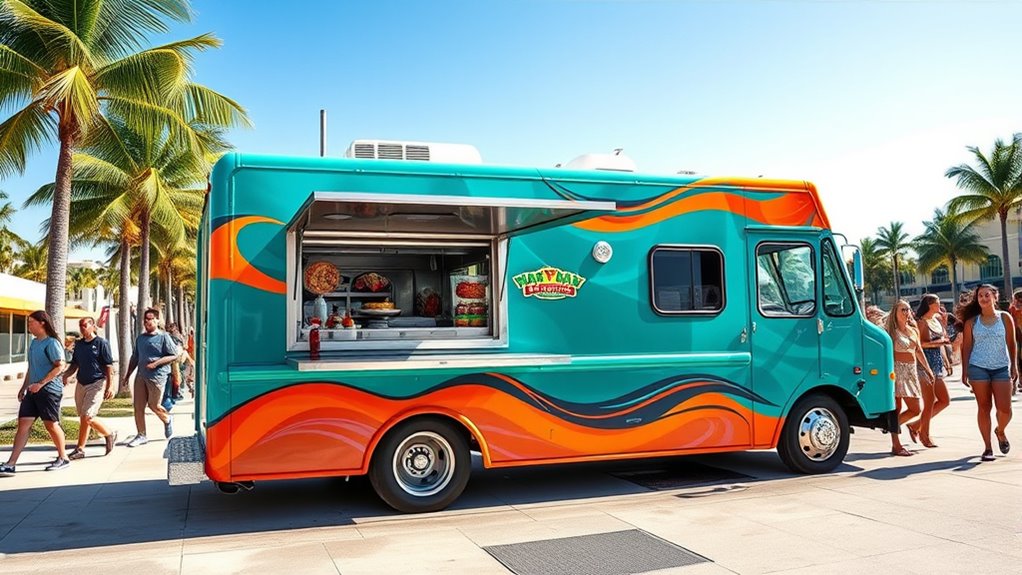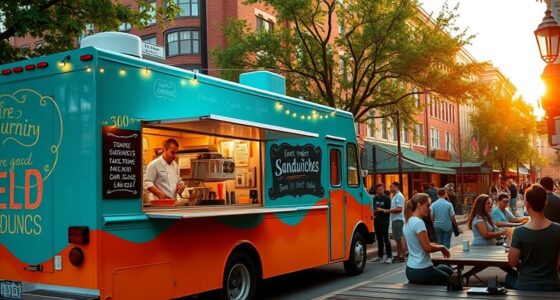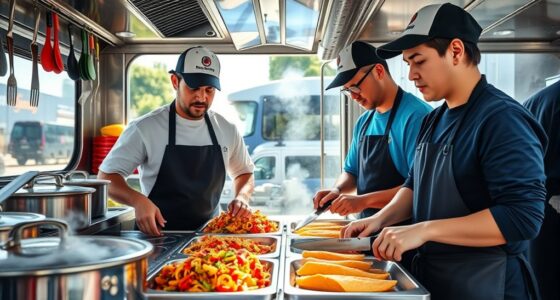To start a food truck in Miami, FL, you need to understand local regulations, including permits, zones, and health certifications. Design a colorful, eye-catching truck that reflects Miami’s diverse culture and build a strong community presence through festivals and social media. Plan your menu with local ingredients and competitive pricing. Invest in the right technology, insurance, and a budget plan. Stay active in the scene, and you’ll find plenty of opportunities to grow—continue to explore for detailed tips.
Key Takeaways
- Obtain necessary permits and food handler certifications through Miami-Dade’s online application system.
- Design an eye-catching truck with vibrant visuals, culturally inspired branding, and clear menu displays.
- Partner with local farms for fresh ingredients and participate in Miami food festivals for exposure.
- Secure insurance coverage including liability, equipment, and weather protection to safeguard your investment.
- Promote your truck via social media, engage with influencers, and participate in community events to build brand recognition.
Vibrant Miami Street Food Scene
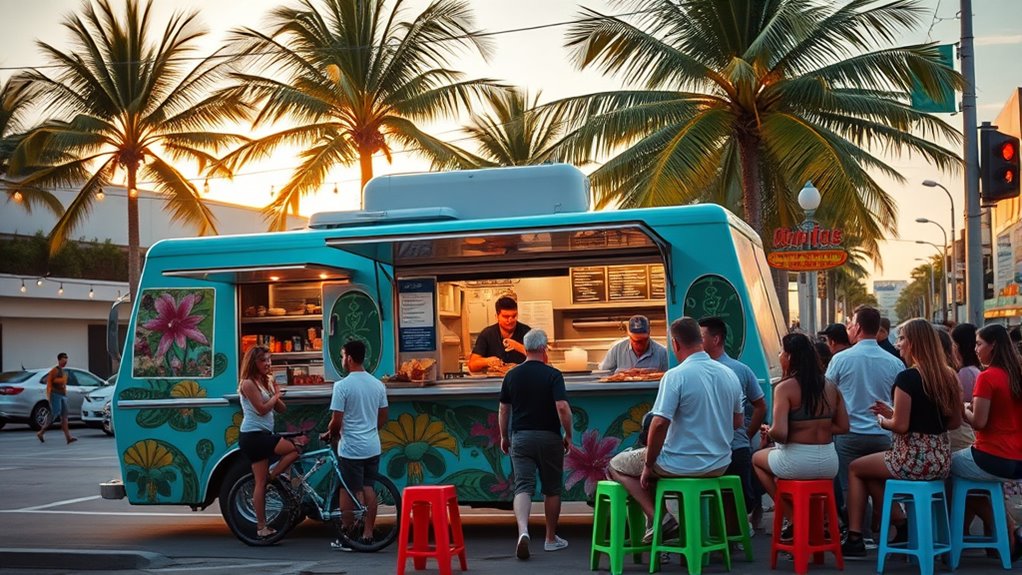
Miami’s street food scene pulses with energy and diversity, making it an ideal place to launch a food truck. Your food truck design plays a vital role in capturing attention and reflecting your unique cuisine, helping you stand out amid the vibrant backdrop. Focus on eye-catching visuals, bold colors, and a clear menu display to attract passersby. Engaging your customers is equally important; create opportunities for interaction through friendly staff, social media integration, and memorable branding. When you prioritize customer engagement, you foster loyalty and generate buzz around your truck. Incorporating holistic approaches to your branding and customer experience can further enhance your presence in Miami’s bustling streets. The lively atmosphere of Miami’s streets offers the perfect environment to showcase your offerings, connect with locals and tourists alike, and establish a thriving food truck business.
Understanding Local Requirements
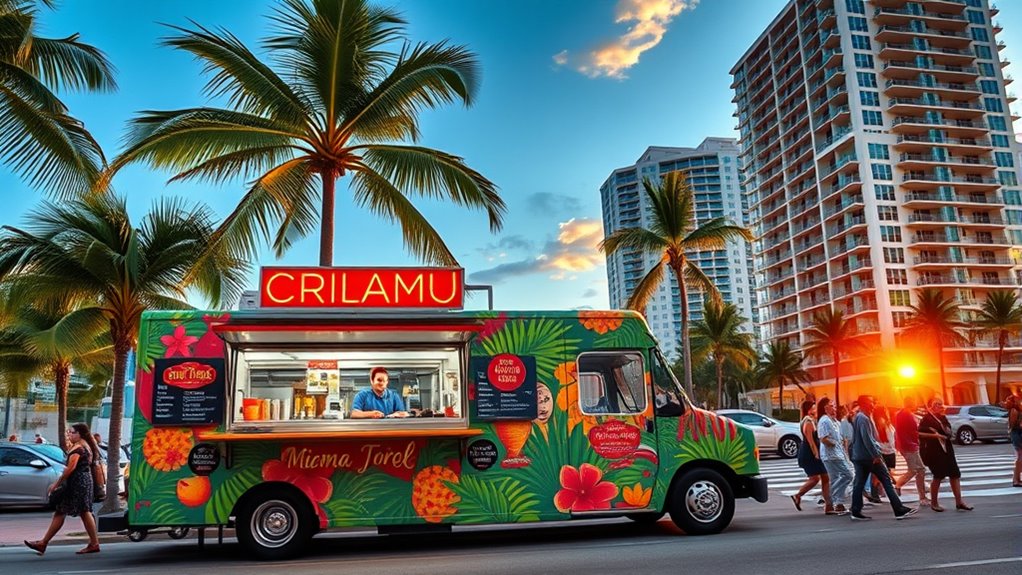
To get started, you’ll need to navigate the online permit application process and guarantee you meet all local regulations. Obtaining your food handler certification is a must to serve food safely in Miami. Additionally, understanding designated truck zones will help you choose the right spots to operate legally and attract customers. Being aware of local regulations related to food truck operations can help you stay compliant and avoid potential issues.
Online Permit Application Process
Handling the online permit application process is a vital step in starting your food truck in Miami, FL. To streamline your journey, here are four key steps:
- Visit the official Miami-Dade online portal for food truck permits.
- Complete the online permit application, providing all required details accurately.
- Upload necessary documents, such as your business license and proof of insurance.
- Pay the applicable fees securely through the portal.
Using the online permit system simplifies the application process, saving you time and reducing paperwork. Make sure to double-check all information before submitting to avoid delays. Once submitted, monitor your email for updates or additional requests. Completing these steps ensures you meet local requirements quickly and efficiently.
Food Handler Certification Requirements
After completing your online permit application, it’s important to make certain you meet all local health and safety requirements before hitting the streets. Miami requires food truck operators to obtain a valid food handler certification, demonstrating they understand proper food safety practices. This certification involves completing approved safety training programs that cover topics like sanitation, cross-contamination, and temperature control. Ensuring you have this certification shows you’re committed to maintaining safe food handling standards, which helps protect your customers and your business. Keep in mind that the certification must be current and recognized by Miami health authorities. Failing to meet these requirements can delay your permit approval and impact your ability to operate legally. Prioritize obtaining your food handler certification early in the process.
Designated Truck Zones
Understanding designated truck zones is essential for legally operating your food truck in Miami. These zones ensure compliance with local regulations and support truck safety. Here are key points to consider:
- Research Zones: Verify which areas permit food trucks and follow specific rules for each zone.
- Permits and Restrictions: Obtain necessary permits and adhere to time restrictions and size limits.
- Vehicle Maintenance: Keep your truck in top condition to meet safety standards and avoid fines.
- Parking and Safety: Park only in approved zones to prevent disruptions and promote truck safety for customers and pedestrians.
Staying informed about designated zones minimizes legal issues, enhances vehicle safety, and ensures smooth daily operations. Properly maintained trucks and adherence to local rules are crucial to your success.
Setting Up Your Base of Operations
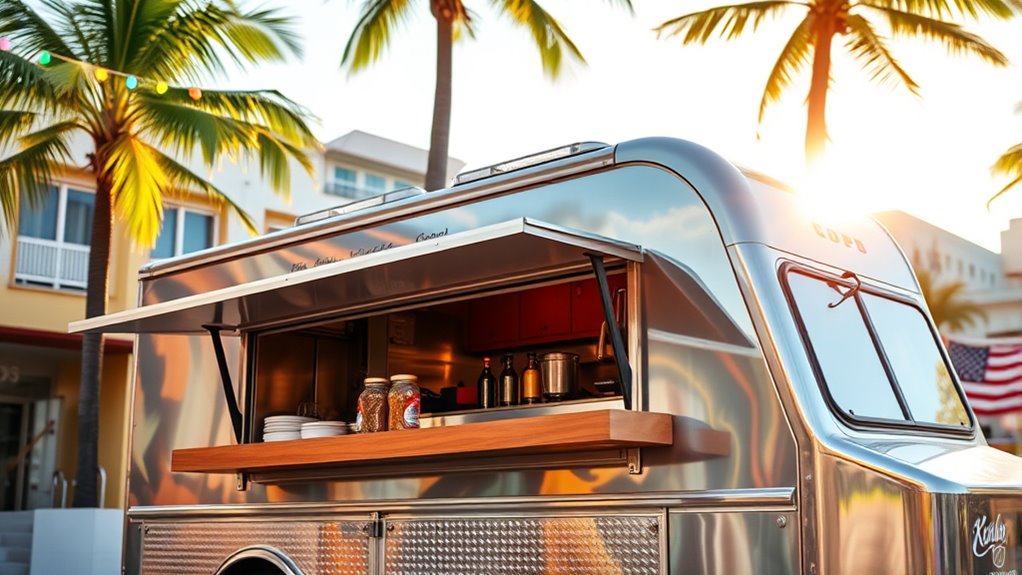
Setting up your base of operations starts with choosing the right kitchen setup. You can explore shared kitchen licensing options to save costs and stay compliant, or design a custom kitchen layout that fits your menu and workflow. Making these decisions early helps you streamline operations and get your food truck rolling smoothly.
Shared Kitchen Licensing Options
Choosing a shared kitchen is a practical way to establish your food truck’s base of operations in Miami, especially if you’re just starting out or looking to reduce overhead costs. Shared kitchen licensing simplifies obtaining the necessary commercial kitchen permits, saving you time and money. To get started, consider these key points:
- Verify that the shared kitchen has valid shared kitchen licensing and permits.
- Ensure it complies with Miami health department regulations.
- Confirm that the facility allows food truck operations and commercial use.
- Review the lease agreement for flexibility and included amenities.
Custom Kitchen Layout Planning
Designing a custom kitchen layout is a crucial step in creating an efficient and functional base of operations for your Miami food truck. Proper layout optimization ensures smooth workflow, safety, and compliance with health codes. Start by evaluating your menu and equipment needs, then arrange your kitchen for maximum efficiency. Consider placement of cooking, prep, and storage areas to minimize movement. Use the following table to guide your custom kitchen design:
| Zone | Equipment Focus | Key Consideration |
|---|---|---|
| Cooking Area | Grills, fryers, ovens | Ventilation and safety |
| Prep Station | Cutting boards, sinks | Accessibility and hygiene |
| Storage | Refrigeration, cabinets | Space efficiency, organization |
A well-planned layout enhances productivity and helps your Miami food truck thrive.
Budgeting and Financing Your Food Truck

To get your food truck rolling, you’ll need to budget for initial equipment costs and explore local small business grants that can help cover expenses. Securing the right insurance policies is also essential to protect your investment and stay compliant with regulations. Understanding these financial aspects sets a strong foundation for your food truck venture in Miami. Additionally, researching cost-effective menu options can help appeal to a broader customer base while maintaining profitability.
Initial Equipment Purchase Costs
Initial equipment purchase costs typically make up a significant portion of your food truck budget, so it’s crucial to plan carefully. To do this, focus on accurate cost estimation of equipment essentials. Start by:
- Listing essential kitchen appliances like ovens, grills, and refrigerators.
- Researching prices from multiple suppliers to compare costs.
- Considering used or refurbished equipment to save money.
- Budgeting for necessary tools, utensils, and safety gear.
Local Small Business Grants
Securing funding is a key step in bringing your Miami food truck to life, and local small business grants can provide a valuable financial boost. Community grants are often available specifically to support local entrepreneurs and small businesses, making them a great source of startup funding. These grants don’t require repayment and can cover equipment, supplies, or marketing expenses. To find these opportunities, check with Miami’s economic development agencies, local chambers of commerce, and small business support organizations. Keep in mind that applying for grants may involve detailed proposals and documentation, so prepare your business plan carefully. Utilizing community grants can reduce your upfront costs and help you get your food truck rolling without heavy debt.
Insurance Policies for Food Trucks
Understanding insurance policies for your food truck is vital for budgeting and securing financing. Proper insurance coverage ensures you’re protected against unexpected costs and liabilities. To navigate this, consider these key aspects:
- Liability protection—covers damages or injuries caused by your truck.
- Comprehensive coverage—protects against theft, vandalism, and weather damage.
- Medical payments—handles injuries to you or employees on the job.
- Equipment coverage—safeguards your appliances and cooking gear.
Having the right insurance policies not only keeps your business compliant but also reassures lenders and investors. It’s a fundamental part of your startup costs and ongoing expenses. Remember, well-chosen insurance coverage minimizes risks and helps you focus on growing your Miami food truck empire.
Designing Your Menu and Pricing Strategy
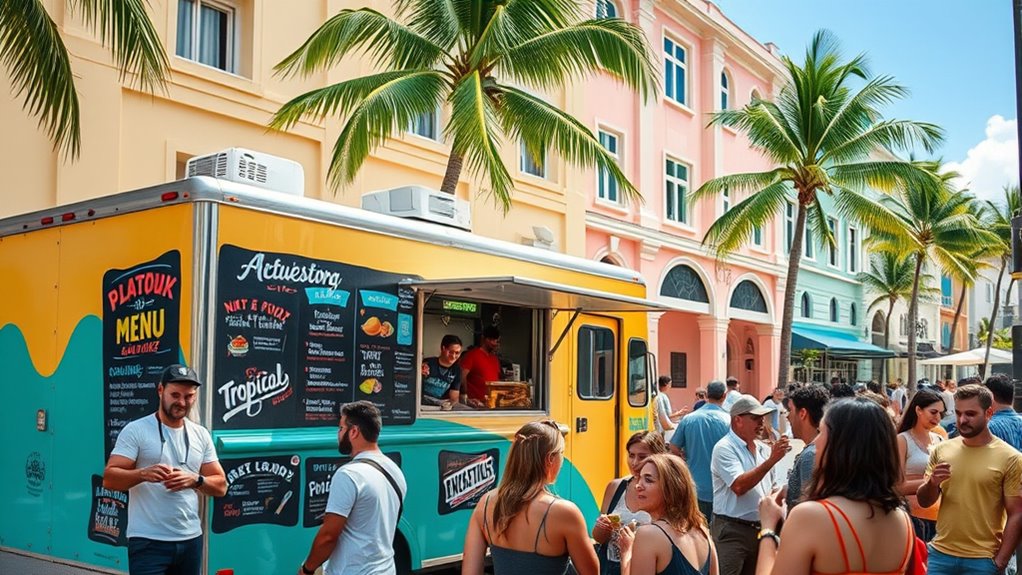
Your menu should highlight fresh, local ingredients that appeal to Miami’s vibrant food scene. Use dynamic pricing strategies to stay competitive and maximize profits during busy times. By balancing quality and affordability, you’ll attract more customers and build a loyal following. Incorporating essential survival gear items can also help ensure your team is prepared for various challenges behind the scenes.
Fresh, Local Ingredient Sourcing
Since fresh, local ingredients are the cornerstone of a successful food truck, designing your menu around them requires careful planning. Start by establishing local farm partnerships to guarantee consistent access to quality produce. Focus on seasonal ingredient sourcing to keep your menu fresh and exciting. Consider these steps:
- Reach out to nearby farms to build reliable relationships.
- Adjust your menu seasonally to highlight available ingredients.
- Incorporate versatile items that showcase local flavors.
- Price your dishes to reflect the premium quality of fresh, local products.
Dynamic Menu Pricing Strategies
Building a flexible pricing strategy for your food truck menu allows you to maximize profits while keeping customers happy. Dynamic pricing lets you adjust menu prices based on factors like demand, time of day, or special events, ensuring you’re always competitive. Menu customization is key; offering different portion sizes or combo deals can cater to various customer preferences and price points. By implementing dynamic menu pricing, you can respond quickly to changes in the Miami market, such as busy weekends or off-peak hours. Consider using real-time sales data to fine-tune prices, attracting more customers without sacrificing profitability. This approach helps you stay adaptable, optimize sales, and build a loyal customer base enthusiastic to try your unique offerings.
Technology and Operations
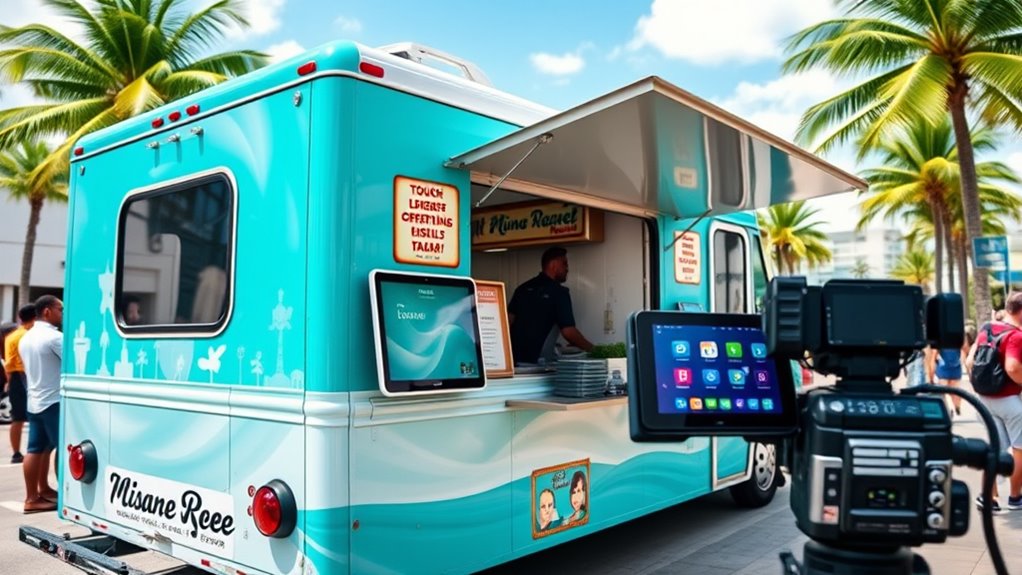
Implementing contactless payment options can streamline transactions and improve customer convenience. Real-time stock tracking software helps you stay on top of inventory, reducing waste and ensuring popular items are always available. Embracing these technologies keeps your food truck efficient and competitive in Miami’s busy food scene. Additionally, utilizing performance tuning techniques can optimize your operational efficiency, ensuring your team runs smoothly during peak hours.
Contactless Payment Options Available
Adopting contactless payment options can streamline your operations and enhance customer experience on your food truck. By offering contactless payments and mobile payment options, you make transactions quicker and more convenient. Consider these benefits:
- Faster checkouts, reducing wait times
- Safer transactions, minimizing physical contact
- Increased sales from customers preferring mobile payments
- Easier record-keeping with digital payment integrations
Implementing contactless payments allows your customers to pay with a simple tap or scan, improving efficiency during busy hours. Plus, accepting various payment methods broadens your customer base and builds trust. Staying updated with contactless payments ensures your food truck remains competitive and responsive to evolving payment preferences. This investment not only simplifies your operations but also boosts customer satisfaction in Miami’s vibrant food scene.
Real-Time Stock Tracking Software
Real-time stock tracking software is vital for keeping your food truck’s inventory organized and efficient. With this technology, you can monitor your inventory management closely, knowing exactly what supplies are on hand at any moment. It updates in real time, giving you immediate insight into stock levels, so you avoid running out of key ingredients or overstocking. This helps streamline your operations, reduce waste, and guarantee you’re always prepared for busy hours. By using real time stock data, you can make smarter purchasing decisions and optimize your inventory management process. Implementing this software lets you stay ahead of shortages and keep your menu running smoothly, all while saving time and reducing errors. It’s an indispensable tool for maintaining an efficient and profitable food truck business in Miami.
Marketing and Growing Your Presence
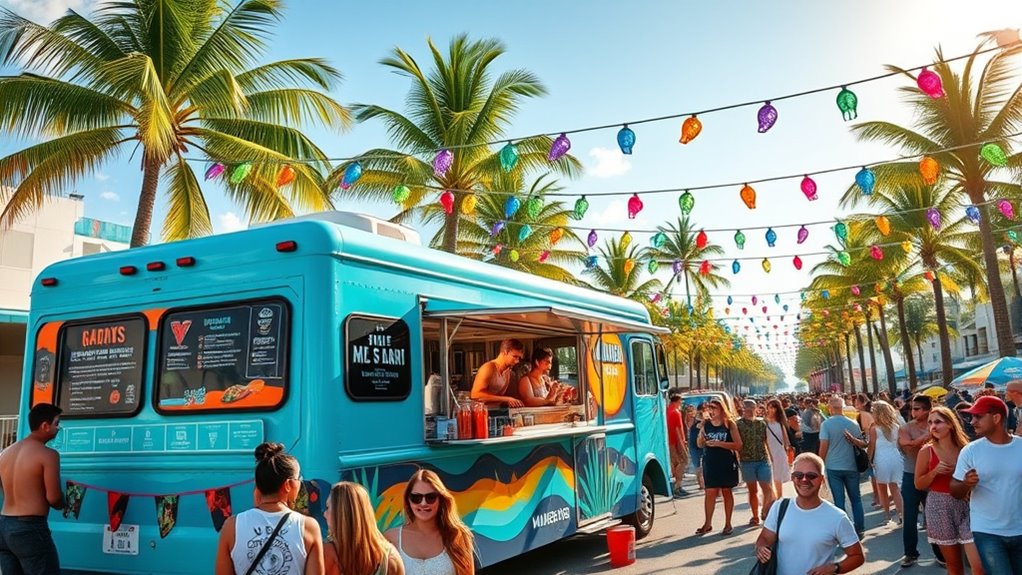
To boost your food truck’s visibility in Miami, participating in popular local food festivals can attract new customers and increase your reputation. Engaging with Miami’s foodie influencers on social media helps spread the word and builds a loyal following. Combining these strategies will give your truck a strong presence in the vibrant Miami food scene.
Popular Miami Food Festivals
Ever wondered how participating in Miami’s vibrant food festivals can boost your food truck’s visibility? These events attract diverse crowds, offering prime opportunities to showcase your food truck styling and mobile branding. To maximize your presence:
- Choose festivals aligned with your cuisine to attract targeted customers.
- Use eye-catching signage and branded wraps to make your truck stand out.
- Offer samples or promos to encourage festival-goers to remember your truck.
- Engage with attendees to create a memorable experience, reinforcing your brand.
Engaging Miami Foodie Influencers
Partnering with Miami’s top foodie influencers can substantially boost your food truck’s visibility and credibility. Social media partnerships and influencer collaborations help you reach a wider, engaged audience that values authentic reviews and recommendations. Start by identifying local influencers whose style aligns with your brand and target demographic. Engage with their content genuinely before proposing collaborations, such as inviting them to try your menu or host exclusive events. When they share their experience, it creates buzz and attracts new customers. Consistent influencer collaborations build trust and make your food truck a recognizable fixture in Miami’s vibrant food scene. Remember, authentic partnerships resonate more with followers, so focus on creating meaningful relationships that highlight your unique offerings.
Miami’s Vibrant Street Food Scene
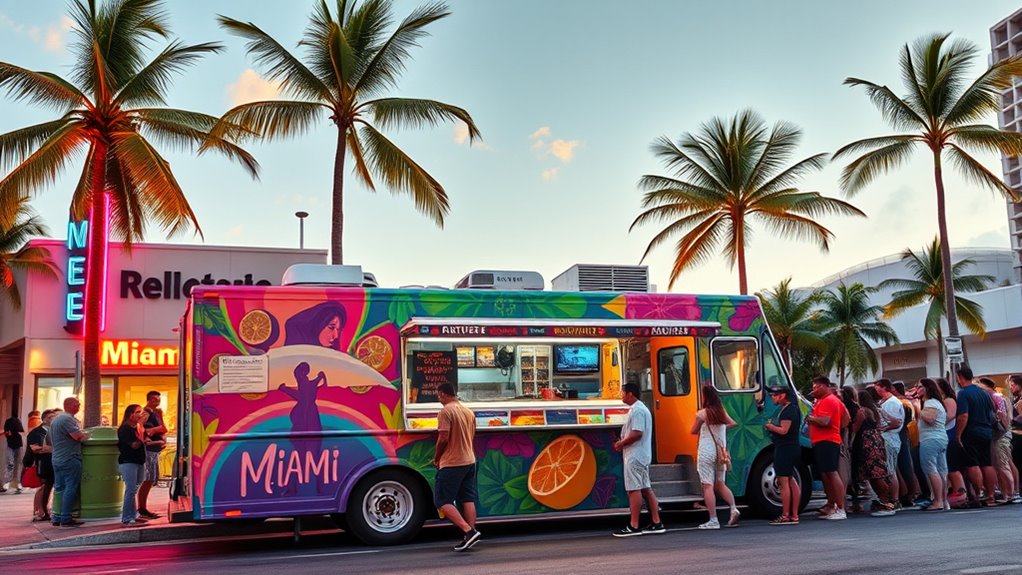
Miami’s street food scene buzzes with energy, offering a diverse array of flavors that reflect the city’s rich cultural tapestry. To stand out, focus on your food truck branding—bold visuals and a memorable name help attract customers. Engage with the community through local events and social media, creating buzz around your truck. Here are four ways to make your mark:
- Partner with local festivals to boost visibility.
- Use vibrant, culturally inspired branding to catch eyes.
- Offer unique, authentic dishes that showcase Miami’s diversity.
- Build relationships through community engagement initiatives.
Frequently Asked Questions
What Permits Are Required for Food Trucks at Special Events in Miami?
You need to obtain event permits and vendor licensing to operate your food truck at special events in Miami. First, apply for an event permit from the event organizer or city, guaranteeing you meet all health and safety standards. Then, secure vendor licensing through the Miami-Dade County or city health department. These permits ensure you’re legally allowed to serve food, helping you avoid fines or shutdowns during events.
How Do I Navigate Miami’s Health Inspection Process for Food Trucks?
Did you know Miami hosts over 300 food trucks? To navigate its health inspection process, you should familiarize yourself with local food safety protocols and prepare your truck accordingly. Schedule inspections early through the Miami-Dade County Health Department’s online portal, ensuring your truck meets all sanitation and safety standards. Being proactive helps you pass smoothly and keeps your food truck operating without delays, so stay organized and attentive to all requirements.
Are There Specific Parking Regulations I Should Be Aware of in Miami?
You need to be aware of Miami’s parking restrictions and obtain the necessary parking permits for your food truck. Always check local signage for restrictions on street parking and avoid metered zones during peak hours. Apply for parking permits through the Miami city government to park legally in designated areas. Staying compliant helps you prevent fines and ensures smooth operations while serving your customers.
What Are the Most Popular Food Truck Cuisines Among Miami Locals?
Ever wonder what Miami locals crave most? You’ll find that vibrant food truck menu trends lean towards Latin-inspired dishes, fresh seafood, and fusion tacos. Popular street snacks include arepas, Cuban sandwiches, and ceviche, satisfying diverse tastes. By offering these favorites, you’ll tap into what Miami residents love most. Are you ready to serve up these crowd-pleasers and stand out among the city’s thriving food scene?
How Does Miami’s Weather Impact Food Truck Operations Year-Round?
Miami’s warm, humid weather means you can operate year-round, but you should plan seasonal menus that adapt to changing conditions. Hot days require plenty of hydration options, and stormy weather can disrupt your schedule. Always prioritize weather-related safety, like securing your truck during storms and avoiding operation during extreme heat. This proactive approach helps you keep customers happy and ensure your food truck runs smoothly regardless of Miami’s weather.
Conclusion
Starting a food truck in Miami lets you embrace the city’s lively street food scene, blending passion with entrepreneurship. While the vibrant flavors and bustling crowds invite you to serve up success, navigate local rules and smart finances to turn that dream into reality. With creativity in your menu and technology at your fingertips, you’ll find that thriving here isn’t just about standing out—it’s about becoming part of Miami’s dynamic culinary tapestry, where every bite tells a story.
